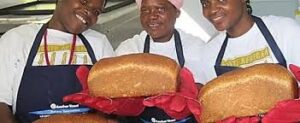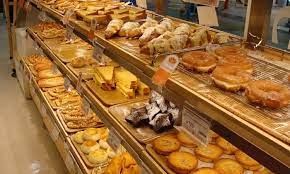


In order to start a successful bakery you need to possess the qualities of an artist, an ingenious financial manager and a marketing wizard. Should any of these qualities be lacking in your make-up, then the only way to succeed is to bring in people who are rich in the areas where you are lacking. This is according to Pierre Malan who heads up the bakery at 7- Eleven’s Head Office in Epping Cape Town. The most essential ingredient in starting a successful bakery is a love and passion for the industry. It is a tough business that has been complicated by the fact that until now there has been nowhere for people to study and qualify for baking in South Africa.
The South African Chamber of Baking is putting together training courses that will be offered in technicon’s around the country. This will give the Industry a much needed boost. Highly qualified people will be more readily available. Therefore, it will be possible to maintain high standards in the industry. When starting a bakery, like any other business, it is vital to understand exactly who your target market is. Is the focus of your production going to be in up-market confections, mass production of bread or perhaps something in -between. Once you have a clear understanding of the direction you wish to take it is time to profile your market. This will also help in selecting a good location.
As with any retail outlet the importance of a good location cannot be over-emphasized. In choosing a location, a number of aspects need to be taken into account. Not only is it essential to have a high level of passing trade, it must also be thew right kind of passing trade. An upmarket confectionery for example, cannot be successful in a low-income area. Common sense must be exercised when selecting a site. No doubt a confectionery store situated between weight loss outlet and a gym will not be very popular. If the focus of your bakery is the mass production of bread then the best location will most likely be in an industrial area, at a railway station or taxi rank or any other position that is close to the population you wish to service and can be seen by them. An excellent location may not be enough. You cannot always rely on passing trade. It is too dependent on the time of the month. You have to look for business elsewhere to supplement your turnover.
Coffee Shops, food factory shops, wine farms, guest houses and tea gardens are all potential clients for an upmarket confectionery. With an active sales drive and one driver it is possible to more than double the turnover of an outlet. This can make the difference between success and failure. If the focus of a bakery is bread production, the turnover could possibly increased by supplying more exotic breads in addition to the standard loaves.” South Africans are becoming more and more adventurous when it comes to bread”, says Malan. People are starting to experiment with some of the continental breads.
Display counters, fridges, and lightning are all critically important. This is the important place to invest your money. If your products look good and are well displayed you will feel the impact on your bank account. Once the bakery is up and running the quickest way to chase all customers away is to try and save money by using low quality ingredients or selling products that have passed their expiry date. Word of mouth can be the best advertising but also has the power to destroy your business. Every single client must be delighted. For people who have always dreamed of starting a bakery, but do not have the necessary experience and knowledge in either baking or business, there is a range of franchise opportunities available.
BAKERY REQUIREMENTS
Marketing
Generate interest in the “bakery” before opening by putting up a sign and distribute pamphlets as soon as possible. This way you can promote the opening by offering a special offer for opening day and also promote the products you are planning to sell.
Health Requirements
- No business can sell prepared food to the public until they have a health certificate.
- During a health inspection the council will check:-
- Sinks and tables in the food preparation area – these should preferably of stainless steel, which is easy to clean and does not harbor dirt and bacteria.
- Ceilings, walls, and floors (for cracks where bacteria might breed).
- Ventilation and lightning. (to avoid damp and dark).
- Storage facilities like fridges and deep freezers – to ensure everything operates at the right temperature – bacteria thrives between seven and 65 degrees.
- Clothing and equipment – such as headgear, overalls and gloves – to be worn by staff who prepare and handle food.
Equipment
- Mixers and ovens depending on what you intend to bake.
- Wrapping material, bags, boxes etc for customers who buy goods to take home.
- Cooling racks for the food.
- Display cases so that your customers can see all of the goods you have available.
- Baking dishes and pans in different shapes and sizes.
- Mixing bowls to accommodate any job.
- Chemical detergents and sanitizers to keep your kitchen clean and safe.
- Various cutlery and utensils that you will need to make the baked goods.
Buying Ingredients
Look for local Wholesalers for goods such as flour, sugar, eggs, milk, chocolate and other baking ingredients. Once you find a few, give them a call to check prices. You can also set up accounts with the wholesalers or pay cash on delivery. If you want a successful operation, do not compromise on quality. The cheapest ingredients may not have the quality you want.
Setting the right price
Ongoing costs, such as ingredients and raw materials, packaging and promotional expenses must be factored into your budget. Prices should take into account things such as employee labour and the cost of the premises including rent and utilities such as water and electricity in addition to the cost of the goods to make the finished product.